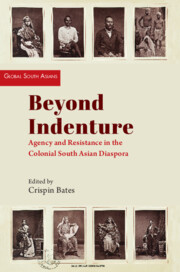Book contents
- Frontmatter
- Dedication
- Contents
- List of Figures and Tables
- Acknowledgements
- Introduction
- I Agency and Resistance
- 1 Negotiating Power in Colonial Natal: Indentured Migrants in Natal, 1860–1911
- 2 Stewed Plums, Baked Porridge and Flavoured Tea: Poisoning by Indian Domestic Servants in Colonial Natal
- 3 Labour Resistance in Indenture Plantations in the Assam Valley
- 4 A Forgotten Narrative of the Satyagraha Campaign: The Treatment of Prisoners between 1907 and 1914
- 5 Toilers across the Seas: Racial Discrimination and Political Assertion among Sikhs in Canada
- II Remigration
- 6 The Remigration of Hindostanis from Surinam to India, 1878–1921
- 7 Not So Anchored: The Remigration of Indians within the Caribbean Region
- 8 On the Move: Remigration in the Indian Ocean, 1850–1906
- III Gender and Family
- 9 Intimate Lives on Rubber Plantations: The Textures of Indian Coolie Relations in British Malaya
- 10 Labouring under the Law: Exploring the Agency of Indian Women under Indenture in Colonial Natal, 1860–1911
- 11 Gujarati ‘Passenger Indians’ in the Eastern Cape since 1900: Business, Mobility, Caste and Community
- 12 The Eurasian Female Workforce and Imperial Britain: Harnessing Domestic Labour by People of Mixed Racial Descent
- IV Legacies
- 13 After the Long March: Colonial-Era ‘Relief’ for Burma Indian Evacuees in Visakhapatnam District, 1942–1948
- 14 Opposing the Group Areas Act and Resisting Forced Displacement in Durban, South Africa
- 15 Indo-Fijians: From Agency to Abjection
- 16 New and Old Diasporas of South South Asia: Sri Lanka and Cyber-Nationalism in Malaysia
- About the Contributors
- Index
4 - A Forgotten Narrative of the Satyagraha Campaign: The Treatment of Prisoners between 1907 and 1914
Published online by Cambridge University Press: 31 December 2023
- Frontmatter
- Dedication
- Contents
- List of Figures and Tables
- Acknowledgements
- Introduction
- I Agency and Resistance
- 1 Negotiating Power in Colonial Natal: Indentured Migrants in Natal, 1860–1911
- 2 Stewed Plums, Baked Porridge and Flavoured Tea: Poisoning by Indian Domestic Servants in Colonial Natal
- 3 Labour Resistance in Indenture Plantations in the Assam Valley
- 4 A Forgotten Narrative of the Satyagraha Campaign: The Treatment of Prisoners between 1907 and 1914
- 5 Toilers across the Seas: Racial Discrimination and Political Assertion among Sikhs in Canada
- II Remigration
- 6 The Remigration of Hindostanis from Surinam to India, 1878–1921
- 7 Not So Anchored: The Remigration of Indians within the Caribbean Region
- 8 On the Move: Remigration in the Indian Ocean, 1850–1906
- III Gender and Family
- 9 Intimate Lives on Rubber Plantations: The Textures of Indian Coolie Relations in British Malaya
- 10 Labouring under the Law: Exploring the Agency of Indian Women under Indenture in Colonial Natal, 1860–1911
- 11 Gujarati ‘Passenger Indians’ in the Eastern Cape since 1900: Business, Mobility, Caste and Community
- 12 The Eurasian Female Workforce and Imperial Britain: Harnessing Domestic Labour by People of Mixed Racial Descent
- IV Legacies
- 13 After the Long March: Colonial-Era ‘Relief’ for Burma Indian Evacuees in Visakhapatnam District, 1942–1948
- 14 Opposing the Group Areas Act and Resisting Forced Displacement in Durban, South Africa
- 15 Indo-Fijians: From Agency to Abjection
- 16 New and Old Diasporas of South South Asia: Sri Lanka and Cyber-Nationalism in Malaysia
- About the Contributors
- Index
Summary
Under the leadership of Mohandas K. Gandhi, the Indian community staged the first non-violent mass movement in South Africa. This involved defiance of unjust laws, courting of imprisonment, boycotts, marches and strikes. In the Transvaal, then under British rule, 3,000 Indians, including more than one-third of adult males and even some children, went to prison and suffered privations between 1908 and 1911. Over a hundred were deported to Bombay and Colombo, often leaving their families behind without support. In 1913, the struggle extended beyond the Transvaal when nearly 40,000 workers, equivalent to over half of the adult Indian population of Natal, struck work. Almost 10,000 were imprisoned, some in mining compounds. Some workers were killed and many injured. Yet in the vast corpus of literature on the Satyagraha campaigns, the treatment of Indian prisoners, both men and women, has not been examined or documented fully.
Existing studies have focused mainly on the leadership of Gandhi and the socio-economic background of the Indian resistance in South Africa. Gendered aspects of the struggle have mainly been documented through a feminist lens seeking to debunk the myth of docile Indian women in the diaspora. Surendra Bhana and Neelima Shukla-Bhatt published poems written in Gujarati, English and Hindi during the movement and produced an interesting literary study of the struggle. In addition, numerous biographies of Gandhi deal with the Satyagraha campaigns, but they are focused on Gandhi, his leadership and spiritual development. However, none of the aforementioned studies has examined, in-depth, the prison conditions and treatment of satyagrahis.
Gandhi’s Collected Works and the Indian Opinion are perhaps the only first-hand insights on the prison conditions of both men and women incarcerated in Durban and Johannesburg during the Satyagraha campaigns between 1907 and 1914. This chapter documents the treatment and impact of prison conditions on satyagrahis between 1907 and 1914. For many resisters, the prison became a site of struggle; it did little to deter or diminish their resilient spirit. They became more defiant amidst the plethora of discriminatory laws and repeated imprisonment. In exploring the incarceration of Satyagraha prisoners, this chapter shifts the focus from the coloniser to the colonised, to the marginalised and subaltern groups, ‘viewing them as important historical actors in their own right’. Clare Anderson, in her study on the 1857–1858 Indian uprising, shares a similar trajectory revealing how prisons became ‘sites of Indian resistance’.
- Type
- Chapter
- Information
- Beyond IndentureAgency and Resistance in the Colonial South Asian Diaspora, pp. 85 - 99Publisher: Cambridge University PressPrint publication year: 2024



